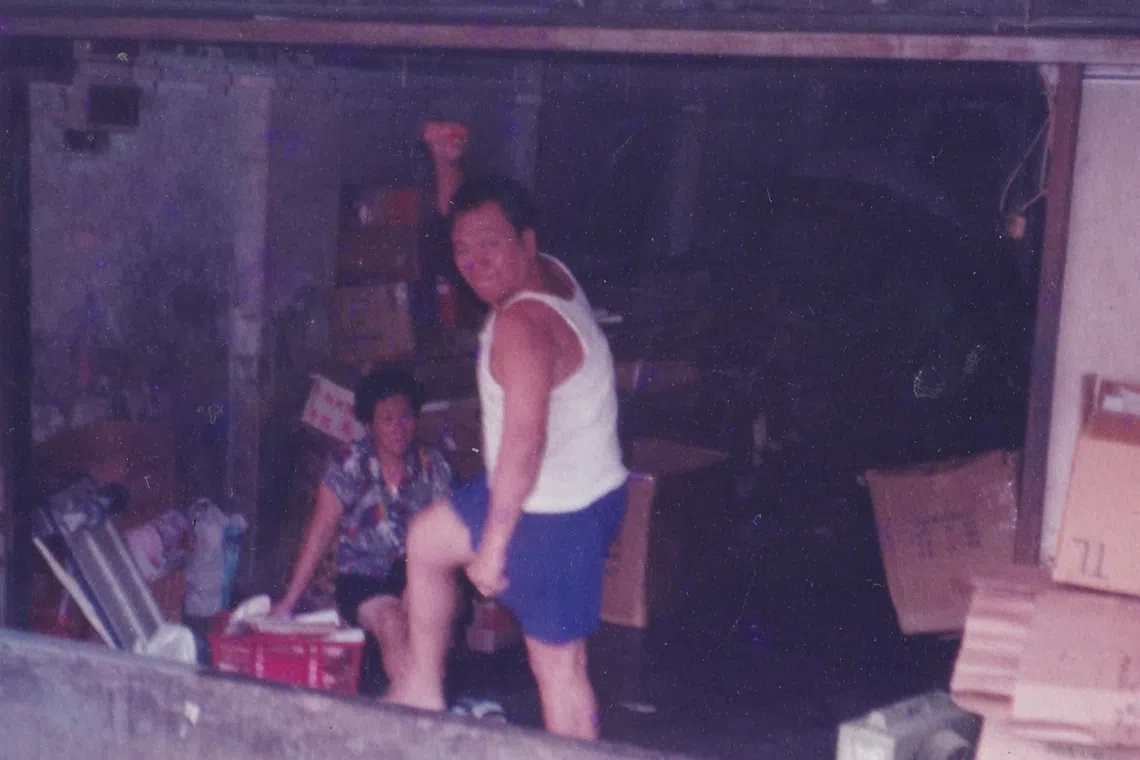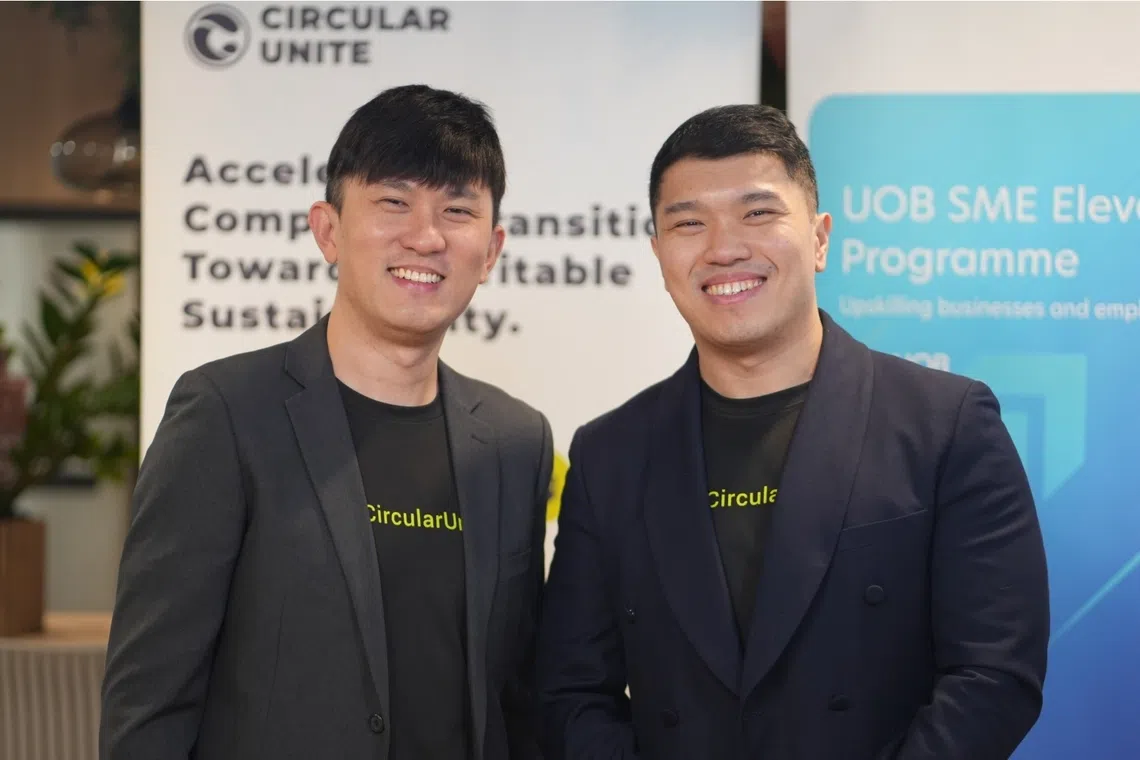Karung guni men, or scrap dealers, used to haul hefty bundles of waste paper and cartons to the Tay family’s Chinatown shophouse in the 1970s and 1980s.
The seven-member household ran their waste collection business from the shophouse’s ground floor, taking turns to weigh the waste on clunky counting scales and scribble payment tickets. They lived upstairs for over 30 years until the early 1990s, eventually sheltering three generations under one roof.
Today, the tedious process has been dumped in the scrapheap of history – thanks to a new generation of entrepreneurs leveraging technology to optimise waste management.
Among them is 37 year-old Emmanual Tay, the third generation in the business. He has since replaced the traditional counting scales with smart ones that use artificial intelligence (AI) to analyse and alert users on waste patterns.
“I wanted to reimagine this traditional business through technology,” says Mr Emmanual Tay, chief executive officer and co-founder of Circular Unite.
He co-founded the start-up in 2020 with his older brother, Andre, 41, to help companies optimise waste management through data analytics, Internet of Things (IoT) hardware, and audits. At the time, industry practices were still largely manual, the younger Mr Tay says.
He shares that Circular Unite’s revenue is on track to hit around $800,000 by end-2025, tripling 2024’s figures.
The start-up was among the three winners of Asia-Pacific Economic Cooperation’s (Apec) Bio-Circular-Green Economy Award 2025 in October, which honours individuals and entities driving sustainable growth from Apec countries. Singapore is one of 21 member economies.
Besides the Tay brothers, the start-up has eight employees, mostly in their 20s and 30s. Circular Unite was one of 33 start-ups selected for GreenTech Accelerator 2024, a UOB FinLab programme supporting sustainable tech ventures across South-east Asia. The bank describes UOB FinLab as its strategic community enabler.

Grandparents of Mr Emmanual and Andre Tay sort out cardboard boxes at their family’s old operations.
PHOTO: COURTESY OF EMMANUAL TAY
Circular Unite’s technology works like this: Before discarding items at the bin centre, the building’s tenants scan a QR code linking the disposal to their respective unit. Sensors embedded in the bins record the waste’s weight, composition and disposal time.
The system then generates insights like alerts on rising waste volume and waste reports aligned with industry standards, Mr Tay says, modernising a system that began with his grandfather’s pen-and-paper logs. It is being piloted at shopping centres including Marina Bay Sands.
Mr Tay had not initially intended to go into the industry, he says.
The youngest of three siblings, he was working in finance before giving in to his parents’ “relentless requests” to join the family business in 2012.
By then, Mr Tay’s father had established his own company: Tay Paper Recycling, a major truck-and-factory recycler operating in Tuas and founded in 1989.
“I went in, and never looked back,” says Mr Tay. “I grew to love the industry.”
Over the next seven years, he ran the gamut of operations: Planning truck routes, engaging clients, preparing tenders, and overseeing certifications.
He began tinkering with ways to optimise manual processes, from digitising records to standardising assessments once driven by gut and feel.
His brother Andre had spent nearly a decade in business development at Singapore renewable and low-carbon energy firm Sembcorp before partnering Mr Emmanual Tay to run a data analytics academy focused on waste in 2018. It closed in 2020.
Drawing on Mr Andre Tay’s analytics background, honed during his studies at the Singapore University of Social Sciences, Circular Unite eventually pivoted from consultancy to greentech after clients repeatedly asked: “Now that we have the data, what do we do with it?”
From 2022 to 2025, Mr Emmanual Tay joined 14 accelerator programmes and challenges in Singapore, Thailand, and Japan, organised by corporates spanning hospitality to technology.
He calls his approach “strategic”: “Each time, we want our pilot to convert the accelerator to a client or gain visibility in a particular industry.”
One such opportunity came through UOB Finlab’s GreenTech Accelerator, which ran from June to November 2024. Circular Unite was one of 33 start-ups from Singapore, Malaysia and Thailand, tackling challenges in energy efficiency, zero-waste supply chains, and carbon management.
There, he secured mentorship, corporate partnerships, and funding for Circular Unite’s pilot schemes. The bank supported 15 pilot projects – including Circular Unite’s – with a combined six-figure fund.
Among his three UOB mentors was Mr Don Wee, senior vice-president from the bank’s innovation group. He encouraged Mr Tay to frame his pitch around clear commercial and measurable environmental, social and governance outcomes, which helped secure pilot opportunities with other corporate partners.
“Data is a critical part of (UOB’s sustainability) journey – it builds accountability, enables us to measure outcomes, and helps financiers like UOB channel capital towards credible solutions,” Mr Wee says.
The GreenTech Accelerator is one of UOB FinLab’s programmes designed to meet SMEs’ evolving needs through practical knowledge, mentorship and networks, says Mr Shannon Lung, head of UOB FinLab.
Its other programmes are the Sustainability Innovation Programme, AI Ready Programme, and Digitalisation Innovation Programme: Womenpreneur, each tailored to drive sustainability, AI adoption, and empowerment of women-led enterprises respectively.
Since 2015, UOB FinLab has supported over 33,000 businesses across Singapore, Malaysia, Thailand, Indonesia and Vietnam.
At the heart of Circular Unite is N.A.T.A.L.I.E., an AI-powered waste and recycling management platform named after Mr Andre Tay’s 14-year-old daughter. It processes data from IoT devices like smart scales and turns it into tailored insights.
“For instance, (users) can ask our chatbot how to improve recycling efficiency, and N.A.T.A.L.I.E. will provide recommendations based on their waste data and our aggregated best practices,” says Mr Emmanual Tay.
He says that guardrails are in place to prevent N.A.T.A.L.I.E from accessing sensitive information.
Circular Unite uses a framework to verify its data, making sure it can be used for compliance and environmental, social and governance reporting, he says. This includes cross-checking data with physical spot checks and tagging each data point with a timestamp, user ID and location.
Circular Unite’s data-driven approach also powers waste audits.
A waste-sorting exercise on Jan 20-24 at UOB Plaza 1 and 2 in Raffles Place revealed how waste was distributed between UOB-occupied floors and tenant spaces, according to UOB.
This allowed the bank to differentiate the waste stream types of its employees and tenants, improving the bank’s waste reduction strategy.
Looking ahead, Mr Emmanual Tay hopes to deepen engagement with existing clients like mall owner-operator Sunway Malls in Malaysia and food and beverage company PepsiCo in Thailand.
Circular Unite is also developing more IoT hardware, including a robot that sorts, weighs, and analyses waste using sensors and image recognition, and an AI-powered marketplace to match waste generators with potential buyers, he adds.
Circular Unite may be scaling up across South-east Asia, but its story is rooted in family.
While his father, 62, left the defunct Tay Paper Recycling in 2018, the younger Tays’ Circular Unite runs out of Collyer Quay – just a kilometre away from the Nankin Street shophouse where the Tay family’s waste management legacy began.
The
Right by you
series explores how organisations can drive meaningful impact for communities, customers and employees.
In partnership with


